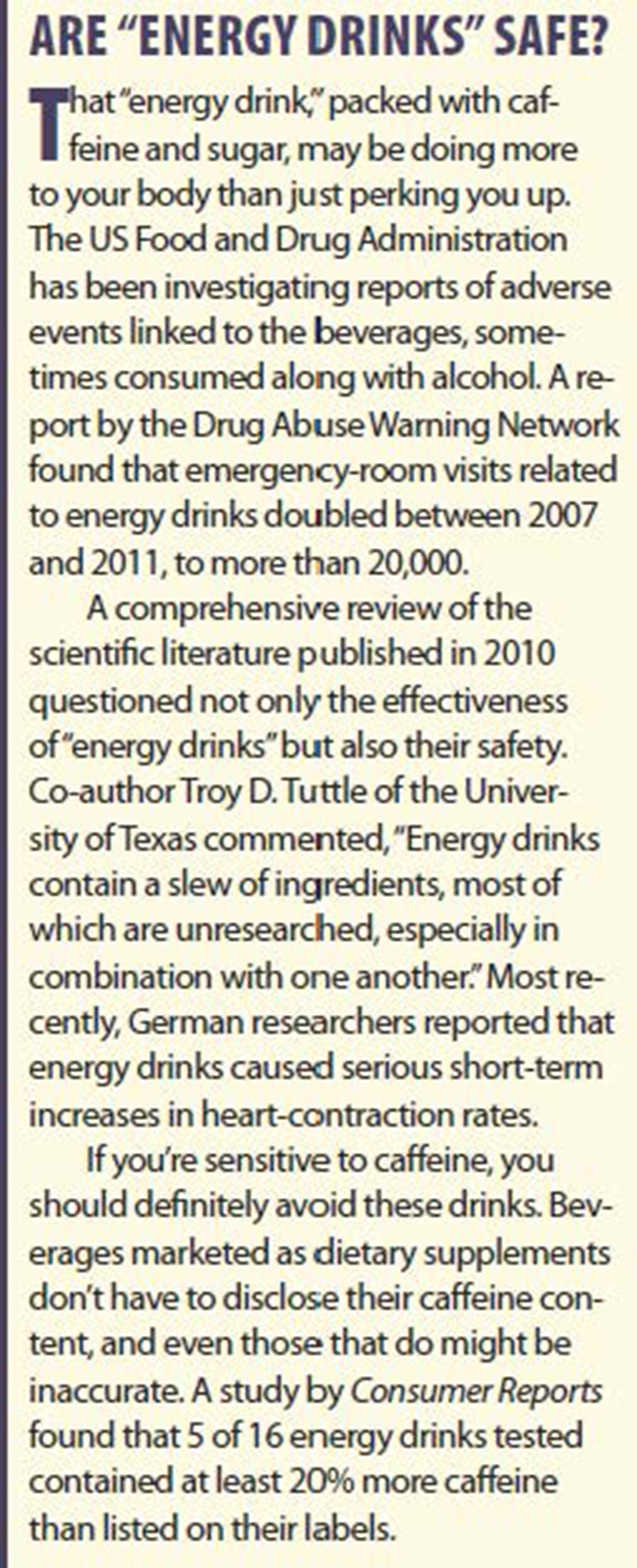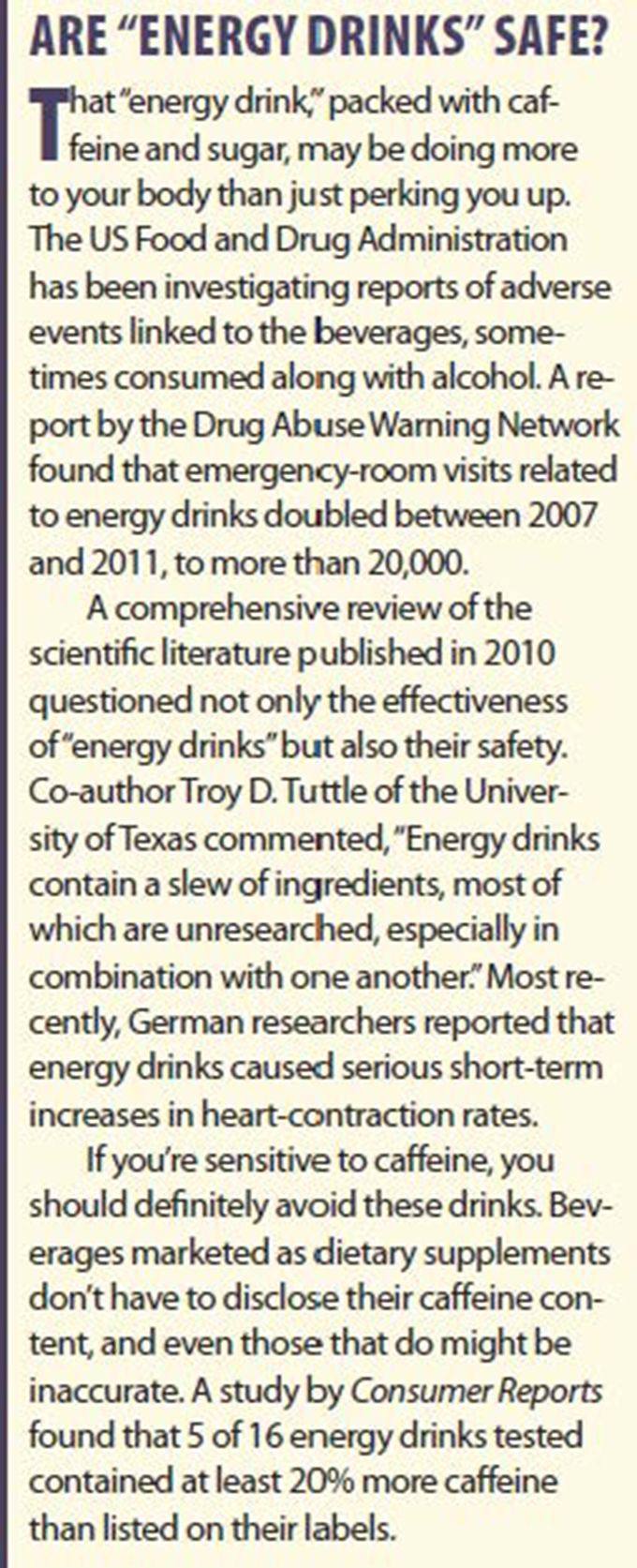Who hasnt wished for more energy at one time or another? Whether youre feeling the effects of hectic modern life or of aging, its only natural to sometimes think your get up and go has gotten up and gone. Little wonder, then, that food, beverage and supplement companies have filled supermarket shelves with products promising to boost energy. So-called energy drinks, introduced only 17 years ago, today represent a $12.5 billion industry.

Energy bars rack up more than $700 million in annual sales. Dietary supplements promise timed-release energy, energy therapy and energy revitalization.
What customers actually get, however, may be nothing more than mega-doses of caffeine, often packaged with herbal extracts of questionable value and with vitamins most people already get from food. Other products play off the double meaning of energy. To most of us, energy suggests feeling alert and stimulated. To nutrition scientists, however, energy simply means calories.
Jeffrey Blumberg, PhD, director of Tufts HNRCA Antioxidants Research Laboratory, explains: Boosting energy requires calories and/or specific nutrients that help convert macronutrients into calories by burning protein, fat or carbohydrates (and most of these vitamins are not characterized as being shortfall nutrients). But what most consumers actually mean by boosting energy is more endurance or vitality or zest. Scientifically, these attributes are not energy in the context of nutrition.
ENERGY IN A CAN OR PILL?: Beverages marketed as energy drinks perk you up primarily because they contain lots of caffeine-typically, as much as a couple of cups of coffee or four colas. Caffeine does provide energy by stimulating the sympathetic nervous system, though one develops a tolerance to this effect, says Blumberg. But, again, I dont think this is what consumers are thinking about in terms of boosting energy.
Energy drinks may also contain a hefty dose of sugar-the equivalent of a dozen teaspoons of sugar in a single 16-ounce can-which the body rapidly turns into blood sugar. But such short-term blood-sugar spikes dont produce lasting energy, and lead to a crash when this sugary fuel is expended. Consumption of added sugars has been linked to a greater risk of cardiovascular disease, and of course contributes to obesity.
Other ingredients in drinks and supplements contain either still more caffeine or similar substances that affect the body like caffeine; these include green tea, kola nut, guarana and yerba mat.
B vitamins, another common energy-boosting ingredient, are indeed important to unlocking the energy in foods. But youre probably already getting these vitamins in your diet. (The exception for some people is B12-see page 7 in this issue.) Most of the extra B vitamins youre paying for in beverages and supplements simply get flushed out of your system.
You may also find ingredients such as tyrosine, phenylalanine and taurine-all amino acids. As with B vitamins, if youre eating a healthy diet in general and consuming enough protein-packed foods, youre getting enough amino acids and wont benefit from extra.
The evidence that more exotic ingredients, including ginseng, bitter orange and capsaicin, benefit stamina or alertness is sketchy at best. Because bitter oranges active ingredient, synephrine, is chemically similar to that of the banned substance ephedra, some experts worry it may also present cardiovascular risks
ENERGY OR CANDY?: Though marketed as energy-boosters, many energy bars are actually little more than candy bars with added protein and, again, some vitamins and minerals you probably dont need more of.
Most Americans already get plenty of protein (see our September 2012 Special Supplement), and in any case not all energy bars deliver as much high-quality protein as you might think. Those containing gelatin and/or collagen include protein thats not complete, meaning it lacks all the essential amino acids your body must obtain from food. Bars listing casein and/or whey protein or soy protein among their first ingredients are a better choice.
But check the rest of those ingredients carefully. Most energy bars depend heavily on sugar in some form for their purported boost. Ingredients such as high-fructose corn syrup, brown rice syrup and evaporated cane juice all represent caloric sweeteners, even if the label doesnt say sugar.
Most energy bars also contain saturated fat, which contributes to unhealthy cholesterol levels. For a healthier alternative, see our April 2011 recipe for Almond-Sesame Energy Bars.
SIX BETTER IDEAS: So, if energy drinks and bars and supplements dont really boost energy (at least, no differently than a cup of coffee or tea would), what does work?
1. Sustain nutrition throughout the day. I think the best advice is pacing your calories, says Susan B. Roberts, PhD, Tufts professor of nutrition and founder of the online iDiet weight loss program
Start your day with a healthy breakfast, high in fiber from whole grains. One study, published in the International Journal of Food Sciences and Nutrition, compared high-fiber, low-fiber and high-fat breakfasts; when participants ate the high-fiber breakfast, they reported the highest level of alertness throughout the morning.
2. Combine the right carbohydrates with protein. While a candy bar, non-diet soda or sugary energy bar boosts your blood sugar rapidly, foods whose carbohydrates are digested more slowly can keep you going longer. Low-glycemic index carbs are great for sustained energy, along with protein, says Roberts.
For example, a simple peanut butter sandwich on whole-wheat bread delivers protein along with carbohydrates that take longer for the body to convert to glucose (low glycemic). Or try hummus served with whole-grain crackers. Low-glycemic foods include most fruits and vegetables, nuts, beans, minimally processed grains and low-fat dairy foods.
3. Stay hydrated. Avoiding dehydration helps maintain your energy and alertness, Roberts says. Research at the University of Connecticut has shown that even mild dehydration has negative effects on energy levels, mood and clarity of thought.
This doesnt mean you have to guzzle eight glasses of water a day-thats a myth. And the liquid in coffee and tea and even in foods counts toward keeping you hydrated. (So do alcoholic beverages, but drink alcohol only in moderation.) The Institute of Medicine advises simply letting thirst be your guide. With age, some people become less sensitive to thirst, so older adults need to be more vigilant about staying hydrated.
4. Make sure youre getting enough magnesium. USDA research has shown that women with low magnesium levels had higher heart rates and required more oxygen to perform physical tasks: Their bodies had to work harder when deficient in magnesium.
Though magnesium is no magic bullet for boosting energy, its not surprising that it might be important to keeping your body running right. Your body needs magnesium for more than 300 different biochemical reactions. Magnesium is important to the functioning of muscles and nerves, keeping your heart rhythm steady and your blood pressure controlled, energy metabolism, synthesizing proteins, regulating blood sugar and maintaining your immune system.
Older people are at greater risk of magnesium deficiency, as the bodys ability to absorb magnesium from food tends to decrease, while loss of magnesium through the kidneys may increase. Older people are also more likely to take medications that can interact with magnesium, such as certain diuretics and antibiotics.
The Recommended Dietary Allowance (RDA) of magnesium for men over age 30 is 420 milligrams daily and for women over 30 is 320 milligrams. To boost your magnesium intake, choose whole grains, green leafy vegetables, beans, peas, nuts and seeds. (For more on magnesium, see our September 2012 Special Report.)
5. Get active. It may seem counter-intuitive, but using some of your bodys energy is actually the best way to feel more energetic. A more active lifestyle-whether that means going to the gym, playing sports, gardening or brisk walking-will make you feel more energetic. One review of research on exercise and energy levels found that almost every study showed sedentary people who began a program of physical activity reported more energy and less fatigue. In another study, at California State University, just 10 minutes of brisk walking daily improved feelings of energy and mood for up to two hours.
6Get a good nights sleep. Says Tufts Blumberg, Interestingly, many people seek more energy but never consider that fact that they sleep too little or with low quality-and food/nutrients cannot correct this.
The Better Sleep Council
– Keep a consistent bedtime and waking schedule, including weekends.
– Create a relaxing bedtime routine, such as reading, listening to soothing music or taking a hot bath.
– Make your bedroom dark, quiet, comfortable and cool.
– Use your bedroom only for sleep and sex-no work materials, computers or TVs.
– Complete exercise routines at least two hours before bedtime.
– Avoid nicotine. Not only can tobacco products damage your health, they can also impair sleep.
– Finish eating at least two to three hours before bedtime.





















